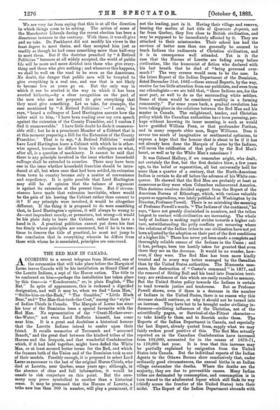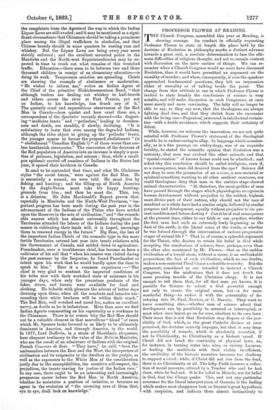THE RED MAN IN CANADA.
ACCORDING to a recent telegram from Montreal, one of the ceremonies that will take place before the Marquis of Lorne leaves Canada will be his installation as Grand Chief of the Lorette Indians, a sept of the Huron nation. The title to be conferred on him—perhaps the installation has taken place 'by this time—is " Sondearonte," or, in plain English, "The Rat." In spite of appearances, this is reckoned a dignified designation, and well it may be, when we find "Lean Man," "Strike-him-on-the-Back," "The Gambler," "Little Black Bear," and" The Man-that-took-the-Coat," among the " styles " of Indian Chiefs in Canada. The Marquis of Lorne has since his tour of the Dominion been a special favourite with the Bed Man. No representative of the "Great-Mother-over- the-Water," not even Lord Dufferin himself, has come near him. It is a great and doubtless a historical honour that the Loretta Indians intend to confer upon their friend. It recalls memories of Tecumseh and "accursed Brandt," and the great duel between the kindred tribes of the Hurons and the Iroquois, and that wonderful Confederation which, if it had held together, might have defied the White Man, or at least secured better terms for the Red, and which the framers both of the Union and of the Dominion took as one of their models. Possibly enough, it is proposed to select Lord Lorne as successor to the last of the original Huron Chiefs, who died at Lorette, near Quebec, some years ago ; although, in the absence of clear and fall information, it would be unsafe to risk conjecture on this point. But the cere- mony may prove symbolical in another than a historical sense. It may be presumed that the Hurons of Lorette, a tribe now less than 300 in number, will play a prominent, if not the leading, part in it. Having their village and reserve, bearing the matter of fact title of Quarante Arpents, not far from Quebec, they live close to British civilisation, and may be supposed to be immediately affected by it. They are attached to their missionaries. Their school has had the services of better men than can generally be secured to teach Indians the rudiments of Christian civilisation, and it is in consequence well attended. Yet is it the case that the Hurons of Loretta are fading away before civilisation, like the humourist of fiction who declared with his last breath that he died of "being governed over- much ?" The very reverse would seem to be the case. In the latest Report of the Indian Department of the Dominion, dated December 31st, 1882—these annual Reports, by the way, receive far too little attention from our publicists, and even from our ethnologists—we are told that, "these Indians are, for the most part, as well to do as the surrounding white settlers. Some of them would be considered wealthy in a farming community." For some years back, a gradual revolution has been taking place in the relations between the Red Man and his master in Canada. The enlightened, tender, and Christian policy which the Canadian authorities have been pursuing, per- haps without knowing its inner meaning, is such as would have gratified William Penn, or that profounder Puritan, and in many respects abler man, Roger Williams. Does it savour too much of imaginative or sentimental optimism, to express a hope that the honour that is about to be if it has not already been done the Marquis of Lorne by the Indians, will mean the ratification of that policy by the Red Man's heart, as well as by the White Man's conscience ?
It was Colonel Mallory, if we remember aright, who dealt, not certainly the first, but the first. decisive blow, a few years ago, to the belief or superstition, all but universally held for more than a quarter of a century, that the North-American Indian is certain to die off before the advance of his White con- queror. He showed that the Red Men are probably at least as numerous as they were when Columbus rediscovered America. This doctrine receives decided support from the Report of the American Bureau of Ethnology, which, with various valuable papers as appendices, was lately published at Washington by its Director, Professor Powell. There is no mistaking the meaning of Professor Powell's words. ." The Indians of the continent," he says, "have not greatly diminished in numbers, and the tribes longest in contact with civilisation are increasing. The whole body of Indians is making rapid strides towards a higher cul- ture, notwithstanding the petty conflicts yet occurring where the relations of the Indian tribes to our civilisation have not yet been adjusted by the adoption on their part of the first conditions of a higher life." There has never yet been made a complete and thoroughly reliable census of the Indians in the Union ; and it has, perhaps, been too hastily taken for granted that even there they are on the decrease. It would be no wonder, how- ever, if they were. The Red Man has been more kindly treated and in every way better managed by the Oanadian than by the United States authorities. The Minnesota mas- sacre, the destruction of " Custer's command" in 1877, and the removal of Sitting Bull and his band into Dominion terH- tory, are evidences of this which are easily recalled to memory. But the United States policy towards the Indians is certain to tend towards justice and tenderness. But as Professor Powell shows, even if there is a decrease in the number of Indians in the United States, there is no reason why this decrease should continue, or why it should not be turned into an increase. They have but to be brought under civilising in- fluences—civilising influences of the Christian, not of the scientifically pagan, or Survival-of-the-Fittest character— to take kindly to them and to flourish under them. The Reports of the Indian Department in Canada, and especially the last Report, already quoted from, supply what we may fairly reckon proof positive of this. The Red Men actually reported on in the Canadian Confederation have increased from 102,000, accounted for in the census of 1870-71, to 110,000 last year. It is true that this increase may be partially explained by emigration from the United States into Canada. But the individual reports of the Indian Agents to the Ottawa Bureau show conclusively that, under ordinarily good circumstances, the annual births in an Indian village outnumber the deaths. Where the deaths are the majority, they are due to preventible causes. Many Indian tribes are decimated by consumption, and consumption is in tarn traced to the adulterated liquor which still finds its way (chiefly across the frontier of the United States) into their midst. .The Report of the Indian Department abounds with the complaints from the Agents of the way in which the Indian Liquor Laws are still evaded; and it may be mentioned as a signi- ficant circumstance that Chinamen should be taking a prominent place among the illegal traffickers in alcoholics, and that Chinese brandy should in some quarters be ousting ruin and 'whiskey. But the Liquor Laws are being every year more strictly enforced ; and the excellent mounted police in the Manitoba and the North-west Superintendencies may be ex- pected in time to crush out what remains of this wretched traffic. Education—there seem to be between two and three thousand children in receipt of an elementary education—is doing its work. Temperance societies are spreading. Chiefs are showing the example of abstinence or moderation. "He wishes to inform me," writes an Indian Agent of the Chief of the primitive Nickickesemenican Band, "that although traders are dealing out whiskey to half-breeds and others across the river at Fort Francis, yet not an Indian, to his knowledge, has drunk any of it." The quaintly cruel and superstitious observances of the Red Men in Canada—how quaint and how cruel these are, a correspondent of the Spectator recently showed—the disgust- ing "medicine feasts" and " potlaches," leading to drunken- ness and death, are steadily, if slowly, declining. "It is satisfactory to learn that even among the degraded Indians, although the elder object to giving up the potlache ' feasts, the younger appear to favour the proposed abolishment "(is " abolishment ' Canadian English ?) "of these worse than use- less heathenish ceremonies." The conversion of the decrease of the Red population of America into an increase is simply a ques- tion of patience, legislation, and science ; thus, while a small- pox epidemic carried off numbers of Indians in the States last year, it spared their brethren in Canada.
It used to be contended that time, and what Mr. Gladstone styles "the social forces," were against the Red Man. He is essentially a nomad, we were told. He must live by fishing and hunting ; and the filling-up of North America by the Anglo-Saxon must take his happy hunting- grounds from him' and then he must die. This, too, is a delusion. Sir John Macdonald's Report proves that, especially in Manitoba and the North-West Provinces, "im- portant progress has been made during the past year in the advancement of the Indians of the Plains who have settled upon the Reserves in the arts of civilisation ;" and" the remark- able success which has almost universally throughout the Territories attended the labour of the Indians during the past season in cultivating their lands will, it is hoped, encourage them to renewed energy in the future." Big Bear, the last of the important Indian Chiefs of the nomadic type in the more fertile Territories, entered last year into treaty relations with the Government of Canada, and settled down to agriculture. Poundma.ker, once a troublesome chief, has become so keen a cultivator of his soil that "when his reserve was visited during the past summer by the Inspector, he found Poundmaker so intent upon his work that he would hardly spare the time to speak to him." Here is a common experience :—" The chief is very glad to contrast the improved conditions of his tribe now with their wretched state of existence in his younger days, when only the precarious products of the lakes, rivers, and forests were available for food and clothing. He beholds with pleasure the advent of better days dawning upon them, when all the comforts and luxuries sur- rounding their white brethren will be within their reach." The Red Man, well watched and cared for, makes an excellent navvy, as docile as he is industrious. More than once we find Indian Agents commenting on his superiority as a. workman to
the Chinaman. There is no reason why the Red Man should not be a valuable element in that marvellous" blend "of races which Mr. Spencer looks forward to as likely to be ultimately dominant in America, and through America, in the world. In 1877, Lord Dufferin, in a strain of Sheridanic eloquence, bore eloquent testimony to the value of the Me2is in Manitoba,
who are the result of an admixture of Indians with the original French Coureurs de Bois. "They have," he said, "been the
ambassadors between the East and the West, the interpreters of civilisation and its exigencies to the dwellers on the prairie, as well as the exponents to the White Men of the consideration justly due to the susceptibilities, the sensitive self-respect, the prejgdices,-the innate craving for justice of the Indian race." In any case, there ought to be an interesting and increasingly prosperous career before the Red Man in North America, whether he maintains a position of isolation, or becomes an agent in the evolution of "the crowning race of them that, eye to eye, shall look on knowledge."



































 Previous page
Previous page